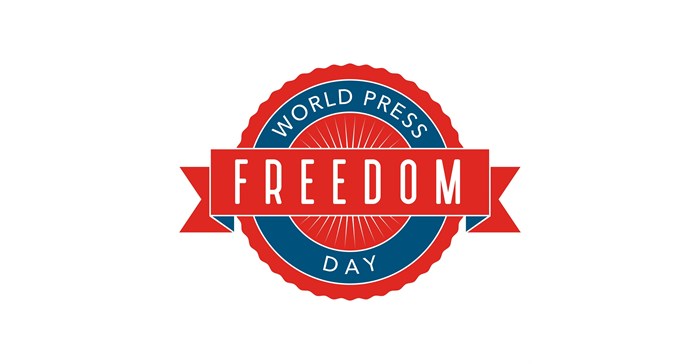As we commemorate this year's World Press Freedom Day, 3 May 2019, the Southern African Editor's Forum (SAEF) reports a mixed bag of media freedom within its chapters and southern Africa as a whole. Although some countries show growth in certain areas many are showing regression overall with South Africa, Malawi, Angola, Lesotho all dropping on the 2019 Reporters Without Borders World Press Freedom Index.

Image source: Gallo/Getty.
Angola had the biggest drop of 12 points from 109 to 121 followed by Lesotho dropping 10 points from 68 (2018) to 78 (2019) and then Zambia from 113 (2018) to 119 (2019). All the other countries that dropped points dropped less than five points in their individual ratings.
Hope
A glimmer of hope is Namibia, which has regained its position of the number one country with the freest media in Africa. Namibia moved three places from 26 (2018) to 23 (2019) in the latest rankings to reclaim the position from Ghana. With Namibia at number one in Africa, this means that no African country is in the top 20 at the moment on the RSF World Press freedom rankings, indicating that more needs to be done with regards to media freedom in Africa as a whole.
Botswana shows a significant change with the new government as they have also gone up four points from 48 (2018) to 44 (2019) in the latest rankings. Eswatini which has one of the worst rankings globally being currently ranked at 147 has shown an upward spiral, moving five places from 152 (2018) to 147 (2019) in the latest rankings. This shows that there are some improvements within the Kingdom of Eswatini, though slow it surely signifies growth in a country where there is high intimidation of journalists.
Though Zimbabwe remains lowly ranked the country has moved one place up from 127 (2018) to 126 (2019) but more can be done especially after the promise of change by President Emmerson Mnangagwa, after taking over from his predecessor Robert Mugabe. Angola is still ranked low globally but there seems to be some good indication of things getting better with journalists now being able to pose questions directly to their president for the first time in 40 years, SAEF believes that President João Lourenço has the power to improve media freedom within his country.
Going Concern
A grave concern is Zambia and Mozambique, where SAEF is aware of arrests of journalists.
- In Zambia the editor of the Rainbow Newspaper, Derrick Sinjela was sentenced to 18 months in jail for contempt of court on 20 December 2018, as he reported and questioned the judiciary in that country.
- In addition Zambia has also introduced a tax on free internet based voice calls or Voice-Over Internet Protocol (VOIP) specifically targeting Skype and WhatsApp. This poses a danger as it now makes those calls more expensive and impedes free communication of media practitioners.
- In Mozambique, Amade Abubacar was arrested on 5 January for documenting deadly attacks by armed groups against civilians in Cabo Delgado province. He has not been tried yet and there is strong evidence that he is being ill-treated while in prison.
- Malawi and Lesotho, having dropped points seem to also be a concern as there seems to be no improvement in those countries yet.
Deaths
There were no deaths of journalists recorded over the period and this gives us hope that the 10 SAEF countries who form a large part of SADC (Southern Africa Development Community) and the seven others, will change these oppressive laws to allow the citizens of southern Africa to express themselves freely through a medium of their choice.
SADC
Southern Africa as a whole has six countries in the top 10 of Africa, namely Namibia, South Africa, Botswana, Madagascar, Comoros and Seychelles, indicating that the region is fairing far much better than the rest of the continent.
Out of the 17 SADC countries only five (DRC, Eswatini, Tanzania, Zambia and Zimbabwe) are seen as difficult situations, while nine countries (Angola, Botswana, Comoros, Lesotho, Madagascar, Mauritius, Malawi, Mozambique, Seychelles) are all seen as problematic situations and two are satisfactory situations (Namibia and South Africa); as opposed to the rest of Africa having a high number of countries showing difficult situation to very serious situation.
SADC has no country that is featured in the very serious situation on the RSF World Press Freedom Index. This highlights that the efforts by civil society within SADC to push freedoms is paying dividends. Although very slow it is worth noticing.
SAEF calls on all SADC governments to ratify the SADC protocols especially the Protocol on Culture, Information and Sports as Article 21 of the said Protocol states: “Parties shall encourage the establishment or strengthening of Codes of Ethics to build public confidence and professionalism in the information sub-sector”.
SAEF also calls on the SADC governments to abolish all draconian laws and align themselves with international standards. This will enable journalists to operate in a free environment without fear of their lives when doing their jobs. SADC must draft laws to protect journalists and the journalism profession including tax exemptions for media houses, as they do play a critical role in society and at times at no cost at all. The media carries public announcements which are not charged but still must pay taxes at the same rate as any other profit-making body, including those that don’t have any corporate social investments.
In addition, SAEF calls on SADC governments to foster a lucrative, peaceful environment for the media in the region as this will help economic growth within the region. Good news costs money to gather and for there to be minimal misinformation the media must be equipped.
SAEF wishes for a SADC that has countries with “satisfactory” or “good situations” on the World Press Freedom Rankings in 2020 and beyond as SADC has the capacity to do so.























